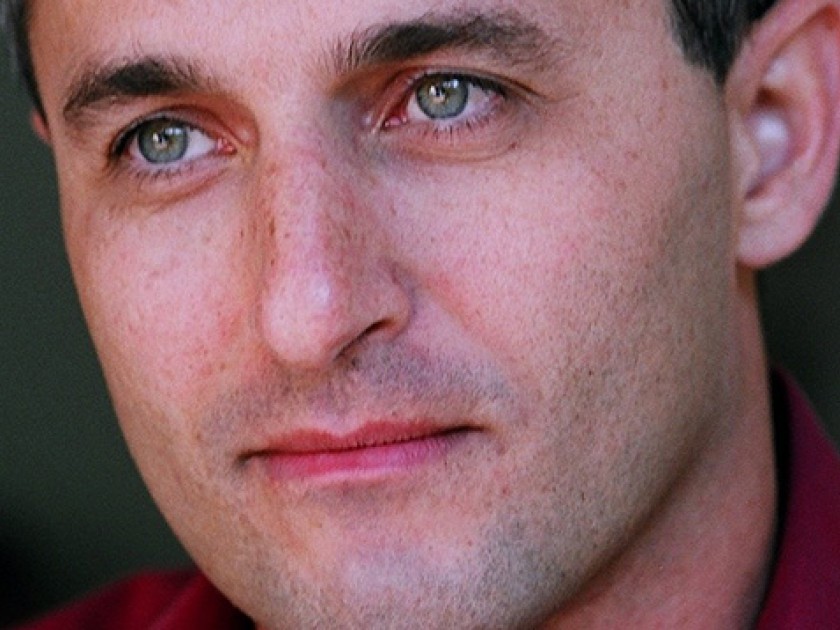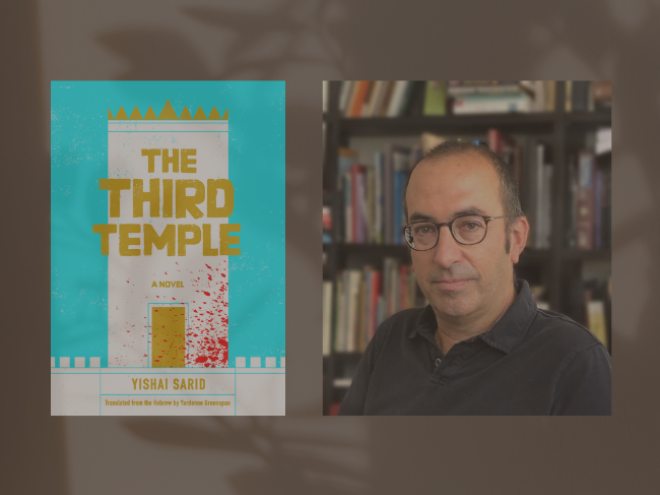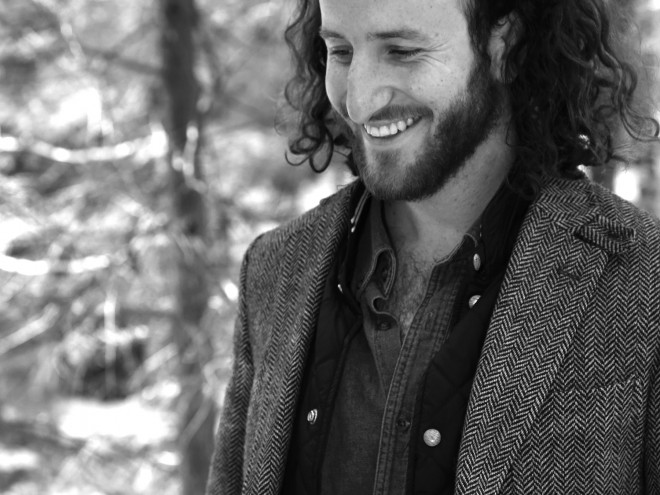
Israeli author Eshkol Nevo’s latest novel, Three Floors Up (vividly translated by Sondra Silverston), is set in one of the rapidly growing suburbs outside Tel Aviv. It encompasses three narratives corresponding to characters who dwell on one of three floors in the same apartment building. Each is terribly self-absorbed by their own worries, but occasionally we glimpse each protagonist through the judgmental eyes of the others with amusing results. Nevo places the reader in the role of listener to their terribly intimate secrets, and the effect is absolutely captivating.
Ranen Omer-Sherman: The idea of “home” is truly a profound and pervasive theme in your novels, and yet you never seem to repeat yourself. I’m fascinated by the contrast between your earlier book Neuland,with its epic temporal and spatial sprawl (from pre-WWII Mandatory Palestine to contemporary South America) and the single apartment building in which most of the action takes place in Three Floors Up. Were you conscious about setting yourself a challenge in moving from that earlier expansiveness to having to work within these relatively claustrophobic confines? Did you imagine yourself creating a kind of microcosm of human behavior?
Eshkol Nevo: I guess I have an unconscious tendency to rebel against my own books. I prefer to always explore something that is completely new. It is not that I am afraid of repeating myself, I just cannot. The new challenge for me in Three Floors Up was in writing characters I am not in love with. The three confessors in this book are full of flaws. As I wrote I found myself resenting them — and also understanding them deeply. And that made the writing process extremely emotional. I wrote this book in five explosive months. I just couldn’t stop writing. I wanted to find out what happens in the end. Both plot-wise and moral-wise.
ROS: I can’t immediately recall another novel that made such memorable use of a single building to suggest an entire society besides The Yacoubian Building by the Egyptian writer Alaa Al Aswany.Was that book at all an inspiration for you in imagining the chaotic, intersecting lives in Three Floors Up?
EN: The Yacoubian Building is indeed a wonderful book. But actually if I had to name one book that I was thinking about while writing Three Floors Up, it would be The Fall by Albert Camus: a man confessing to a bartender about his awful sin. I was trying to capture this unique rhythm of a confession, this “I have a dark secret. I have been keeping it for too long. Now I am going to tell you” kind of urgency.
ROS: In Three Floors Up, as in your other novels, homes are precious spaces of belonging in both a familial and a national sense. Your characters are seized by so much longing and nostalgia for them. Yet in my reading of your works, they can often be very tense spaces imperiled, by wars, divorces — all sorts of conflicts. Why does the problem of home seem to loom so large in your imagination?
EN: I assume it’s a combination of the fact that I moved a lot as a child (thirteen different homes until the age of eighteen, including two in the United States) and the fact that I am living in a country built on immigration. Even the parents’ WhatsApp group of my younger daughter’s class runs in four different languages — Hebrew, English, French, and Spanish. I think, though, that Three Floors Up represents a dramatic shift in focus regarding the theme of home. The question is no longer “Where is home?” but rather “Can we be happy, free, and authentic living in a home with our family?” or “Do we sometimes have to lie to preserve a home?”
ROS: The tripartite Freudian structure of Three Floors Up is a marvelous device; the “three floors” of the English title alludes to the manifestation of id, ego, superego in the three loosely connected stories. It seems as playful – we can’t avoid the provocative pun of the idea of “story” and the structurally separate stories (floors) of the apartment building – as it does profound. Was this something you wanted to explore for a long time? Toward the end of the novel, one of your characters seems to contradict Freud in a deeply moving epiphany.
EN: The Freudian topographic model wasn’t in my mind at the beginning. At the beginning I was only writing, compulsively. Then, when I reached the second floor, I suddenly saw the strong potential of this psychological architecture of a building. And the minute I saw it I could not resist the temptation to build it. Of all the ideas Freud had (and he had a lot), the one that really echoes within me as truth is the fact that every moment of our existence is conflicted: a struggle between competing inner forces. I also disagree with Freud on certain matters – I don’t believe human beings are islands — and I think that is also represented in the book, especially in the conclusion.
ROS: Going back to your wonderful 2004 novel Homesick, it seems that you have long expressed a fondness for the epistolary form. You explore it even more fully here either in the form of written letters, monologues directed to an unseen interlocutor, and, perhaps most memorably, in the form of an extended series of answering machine messages. Much of that communication seems to have a very confessional nature. Why are you so drawn to this subgenre?
EN: I was always fascinated by confessionals in churches. Always wondered what would it be like to share my sins with a priest and be immediately forgiven. But I am a Jew — what can I do? Every book is a long letter to an unseen reader, if you think of it.
ROS: I feel that Neuland stands as a kind of milestone in the very long trajectory of Israeli cultural arguments about rootedness vs. diasporic attachments. In the early years of Jewish statehood, the New Hebrew was configured as utterly rooted, uninterested in travel abroad, the antithesis of the “Wandering Jew.” By contrast, your novel seems to recast Jewish identity in the Diaspora and indeed the very notion of Homeland itself. In your Neuland, a father has gone missing in South America, and his adult son sets off in pursuit. Traumatized by his war experiences as well as the recent loss of his wife, father leaves a stream-of-consciousness narration in his journals that reveals a deeply wounded psyche and a struggle to find a suitable shell in which to shield himself from his hyper-nationalized militaristic past. I wondered if in inhabiting this character so empathically, something changed in your own view about home and belonging in some way? And how do you feel Israel has changed in this regard over the years?
EN: I am part of a new generation of Israelis, specifically those who led the big 2011 social demonstrations that are mentioned in Three Floors Up. We were born here. We speak, think, and dream in Hebrew. Israel for us is an axiom: we are less haunted by the ghost of the past. Therefore we are not intimidated by traveling or even living outside of Israel for a while. Wandering does not threaten our identity. Israelis who choose to leave Israel and find their happiness in Berlin or Miami do not threaten our identity. On the other hand, we demand more from Zionism itself. “Being a safe autonomic territory for Jews” is not enough anymore for us. We are looking for ways to add more values to our national identity (than merely surviving), and culture is intrinsic to that. Of course when I write I do not think about all of this. I am following the footsteps my characters. But when I look back on twenty years of writing (my first story was published in 1997), I would like to believe that I am taking part in this effort of creating a new and more open-minded Israeli society.
ROS: You created a memorable Palestinian character in Homesick with his own sense of attachment to what has become a Jewish Israeli home. And in Three Floors Up, the Rothschild Boulevard social justice tent protests of 2011 transform the life of a lonely widow. In yet another story, there seems to be a hint that a character’s impulse rage and potential for violence might relate to his experiences in the Intifada. Yet for the most part you seem reticent about casting a strong didactic judgment about Israeli society in the manner of Amos Oz, A. B. Yehoshua, and others.
EN: I am deeply interested in the osmosis between public-political life and private-psychological life. I care about my country, but usually I have more questions than answers about that. And when I do have answers, or opinions, I write articles. I have been doing it quite a lot lately since the current government in Israel is trying to slowly change its democratic nature and in my opinion this is a very clear and present danger to the Zionist vision.
ROS: Apropos of my previous question, there is a startling moment when Devora angrily recalls her late husband’s affinity for clean, well-ordered suburban life (she dismissively calls it “bourgeoisville”), which he hoped would overtake the entire country as the fulfillment of Herzl’s vision of Zionism. Now he is gone, and in response to the agitation of young men and women protesting on the streets, she retorts: “Zionism is losing and the people in this building are asleep while it’s happening. Until someone knocks these walls down on them and they wake up — there is no chance that anything will change.” Ironically, the protagonists of each story receive precisely that kind of blow and are shaken out of their complacency for better or worse. This is such a highly-charged moment that I was left wondering if it was expressing something personal for you about how people are living their lives in Israel today? And from your perspective, did those social justice protests achieve anything lasting? If not, would you like to see a return to those days?
EN: It is returning. Actually I am just on my way to a big demonstration against corruption in the government. Israel has the potential to be the most wonderful place on earth, “a light for the gentiles,” but hopeless and visionless people who build their career on creating conflicts, instead of trying to solve them, currently lead the country. Because we lack a real opposition in Israel, the “civil society,” as we call it here, has a responsibility to shout, once in a while: there must be another way.
ROS: Two of your most memorable female characters in Three Floors Up, Hani (a woman whose life consists of little more than caring for her children due to her husband’s frequent trips abroad) and Devora (a retired judge whose late husband fills her restless mind, and whose son no longer speaks to her) are exceptionally three-dimensional and complicated women. In creating their richly imagined inner worlds (or earlier female characters of similar complexity) do you ever consult your wife or other female readers, or do you simply trust your own instincts?
EN: I have three daughters, man. I am surrounded by women in this house. In some conversations at the dinner table I actually feel excluded. Recently my second daughter got a male rabbit as a birthday present. I was so happy that I finally have a buddy! We watched soccer together. Had some man-to-man talks. Until one day a veterinarian friend came to visit. I showed him my new buddy. He took it, examined it and told me: “Sorry, bro, but I have to tell you: it’s not a he, it’s a she!” Seriously – I just listen to women. And men. That’s all you have to do to imagine inner worlds of people: just listen to what they are saying. And not saying.
Ranen Omer-Sherman is the JHFE Endowed Chair in Judaic Studies at the University of Louisville, author of several books and editor of Amos Oz: The Legacy of a Writer in Israel and Beyond.



